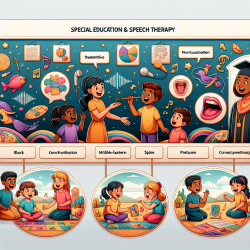Introduction
In a world where data-driven decisions are pivotal, understanding the impact of health policies on community wellness is crucial. The research article "Evaluating the Impact of the Healthy Beverage Executive Order for City Agencies in Boston, Massachusetts, 2011–2013" provides insightful data on how policy changes can lead to healthier beverage consumption. This blog post will explore how speech-language pathologists and educators can utilize these findings to enhance the health outcomes of children in school settings.
The Impact of the Healthy Beverage Executive Order
The Healthy Beverage Executive Order (HBEO) in Boston, initiated by former Mayor Thomas M. Menino, aimed to reduce the availability of sugar-sweetened beverages (SSBs) on city properties. The study showed significant results:
- A decrease in the average sugar content of beverages by 13.1 grams.
- A reduction in average calories per beverage by 48.6 kcal.
- A significant drop in the availability of high-sugar "red" beverages by 27.8%.
These outcomes highlight the effectiveness of policies in promoting healthier choices and reducing the consumption of unhealthy beverages.
Application in School Settings
As practitioners focused on creating positive outcomes for children, integrating similar policies in school environments can be beneficial. Here’s how:
- Implement Traffic-Light Systems: Adopt a traffic-light system for beverages in school cafeterias and vending machines to guide students towards healthier choices.
- Educational Campaigns: Use educational materials to inform students about the benefits of choosing healthier beverages, similar to the educational materials used in the HBEO.
- Policy Advocacy: Advocate for school policies that limit the sale of SSBs and promote healthier options, aligning with the success seen in Boston.
Encouraging Further Research
While the HBEO provides a strong case for policy-driven health improvements, further research is necessary to tailor these findings to specific school settings. Consider the following research directions:
- Investigate the long-term health impacts of reduced SSB consumption in school-aged children.
- Explore the role of parental and community involvement in sustaining healthy beverage policies in schools.
- Analyze the economic implications of implementing such policies in diverse school districts.
Conclusion
Data-driven decisions are essential in crafting policies that lead to healthier communities. By leveraging the insights from the HBEO study, speech-language pathologists and educators can advocate for and implement changes that promote healthier beverage choices in schools. Such initiatives not only support the physical health of students but also contribute to a conducive learning environment.
To read the original research paper, please follow this link: Evaluating the Impact of the Healthy Beverage Executive Order for City Agencies in Boston, Massachusetts, 2011–2013.










